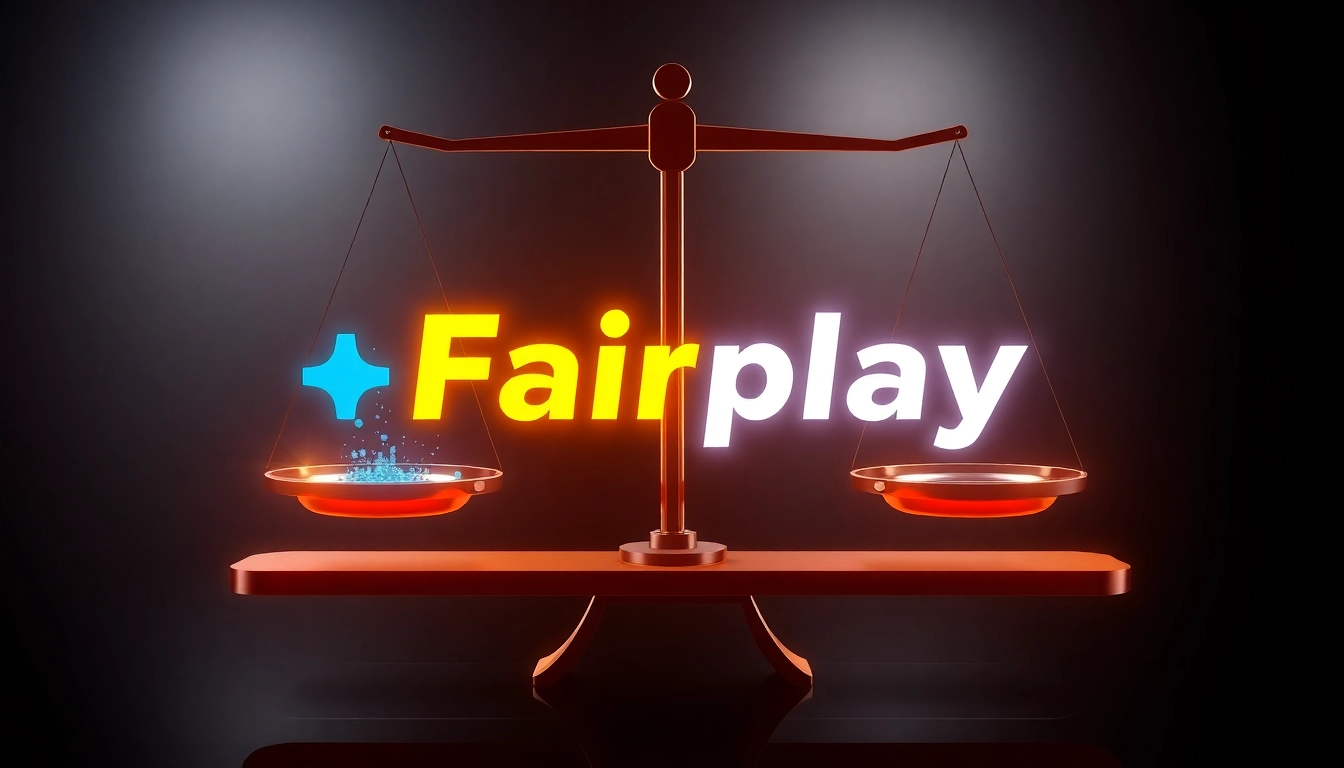Mastering Fairplay: Strategies and Insights for Ethical Decision-Making and Trust Building
Understanding Fairplay: The Foundation of Trust and Integrity
In today’s interconnected digital world, the concept of fairplay has become central to securing trust, fostering transparency, and ensuring ethical standards across various industries. Whether in online gaming, digital rights management, financial services, or content streaming, fairplay embodies the principles of fairness, honesty, and integrity that underpin genuine stakeholder confidence. As organizations and platforms navigate complex regulations and heightened user expectations, understanding the foundational elements that define fairplay is crucial for developing trustworthy systems and cultivating sustained success.
What Is Fairplay and Why Does It Matter?
Fairplay refers broadly to practices, protocols, and technological innovations that ensure fairness, transparency, and impartiality within digital and physical ecosystems. At its core, fairplay signifies creating an environment where parties can engage confidently, knowing that rules are enforced objectively, and outcomes are free from manipulation or bias. This commitment to equity applies equally in gaming, financial transactions, content distribution, and beyond.
In the context of online platforms—particularly in betting, gaming, and digital content—the importance of fairplay cannot be overstated. It forms the bedrock of user trust, regulatory compliance, and market credibility. A platform that prioritizes fairplay not only reduces fraudulent activities but also enhances user engagement, loyalty, and reputation. Conversely, failure to uphold these principles can lead to legal repercussions, financial losses, and irreversible damage to brand integrity.
Historical Context and Evolution of Fairplay Standards
The notion of fairness has ancient roots, dating back to early trade and communal agreements. However, formalized standards for fairplay emerged during the rise of organized sports and gambling in the 19th and 20th centuries. These early efforts aimed to regulate betting practices, establish rules to prevent cheating, and promote equitable competition.
With technological advancements, especially in digital domains, fairplay evolved into sophisticated frameworks leveraging digital rights management (DRM), cryptographic techniques, and blockchain technologies. The rise of online gaming and streaming services—like Apple’s FairPlay DRM—further refined the standards and tools used to uphold fairness in content delivery and access control.
Today’s fairplay standards are shaped by a confluence of regulatory policies, industry best practices, and innovative solutions like AI governance platforms. These developments reflect a global commitment to accountability, user protection, and the ethical deployment of technology.
Key Principles of Fairplay in Modern Applications
- Transparency: Clear rules, accessible information, and open communication channels ensure all stakeholders understand how decisions are made.
- Impartiality: Fair and unbiased processes prevent favoritism and discrimination, fostering equitable treatment.
- Accountability: Systems must allow tracking and auditing of actions and outcomes, enabling swift identification and correction of issues.
- Security: Robust measures protect data integrity, prevent tampering, and ensure privacy.
- Compliance: Adherence to legal, regulatory, and ethical standards is fundamental for sustainable operations.
Modern applications integrate these principles into technology frameworks, operational policies, and organizational culture, ensuring that fairplay remains embedded at every level of interaction.
Implementing Fairplay in Digital Platforms
Best Practices for Fair Play in Online Betting and Gaming
Implementing fairness in online betting and gaming platforms requires a comprehensive approach, combining technological, operational, and regulatory measures. Key practices include:
- Utilizing Provably Fair Algorithms: Tools like cryptographic hash functions and blockchain enable players and operators to verify the fairness of each game outcome independently, fostering trust.
- Regular Audits and Certifications: Engaging third-party auditors to examine random number generators (RNGs), payout processes, and security protocols ensures adherence to industry standards.
- Transparent Payment Processes: Providing clear deposit, withdrawal, and payout procedures enhances user confidence and reduces disputes.
- Clear Terms and Conditions: Articulating rules, odds, and policies transparently prevents misunderstandings and promotes ethical conduct.
Case studies, such as leading online sportsbooks and casino sites, exemplify how these practices lead to increased player retention and regulatory compliance. For instance, platforms that publicly demonstrate their use of provably fair algorithms often enjoy enhanced credibility and competitive advantage.
Leveraging Technology for Transparency and Fairness
Modern technological solutions play a pivotal role in safeguarding fairness across digital platforms:
- Blockchain Technology: By decentralizing the data structure, blockchain enables immutable records of transactions and game outcomes, making fraud virtually impossible.
- Artificial Intelligence and Machine Learning: AI can detect anomalies, patterns of manipulation, or collusion, providing real-time monitoring and enforcement of fairplay standards.
- Secure Random Number Generators (RNGs): Cryptographically secure RNGs ensure unpredictability and fairness in game outcomes.
- Digital Identity Verification: Robust KYC (Know Your Customer) procedures prevent identity fraud and ensure responsible gaming practices.
Integrating these technologies demands not only investment but also commitment to continuous innovation, as malicious actors constantly evolve their tactics. Regular system updates and compliance audits are essential measures to maintain digital fairness.
Challenges and Solutions in Ensuring Fairplay Integrity
Despite technological advances, maintaining trustworthy fairplay systems presents several challenges:
- Manipulation and Cheating: Fraudsters may attempt to exploit vulnerabilities in algorithms or software. Solution: Employ cryptographically secure protocols and frequent independent audits.
- Regulatory Variability: Different jurisdictions have varying standards, complicating compliance. Solution: Adopt adaptable compliance frameworks aligned with international best practices.
- User Distrust: Opaque processes can breed suspicion. Solution: Promote transparency through public verification tools and detailed reporting dashboards.
- Technology Obsolescence: Rapid innovation can render systems outdated. Solution: Invest in scalable, modular systems capable of integrating emerging technologies.
Proactive strategy involves comprehensive risk management, staff training, stakeholder communication, and a culture of continuous improvement.
Legal and Ethical Considerations of Fairplay
Regulatory Frameworks Supporting Fairplay
Legal frameworks governing fairplay are vital for protecting users and ensuring industry integrity. Key regulators include gaming commissions, financial authorities, and digital content agencies. They establish licensing requirements, operational standards, and audit protocols.
For instance, online betting platforms operating in India, such as Fairplay Club, are subject to local laws that mandate fairness, responsible gaming, and consumer protection. Compliance not only shields operators from penalties but also enhances their credibility among users.
International standards, including those from the International Organization for Standardization (ISO) and the Global Gaming Guidance Group (G4), provide a harmonized framework that organizations can adopt to demonstrate compliance globally.
Ethical Dilemmas and How to Address Them
Fairplay implementation may encounter ethical challenges such as balancing profit motives with user protection, data privacy concerns, and cultural differences in fairness perceptions.
Addressing these dilemmas involves:
- Prioritizing User Welfare: Designing systems that promote responsible engagement and prevent addiction.
- Ensuring Data Privacy: Complying with privacy laws like GDPR and promoting transparency in data handling.
- Cultural Sensitivity: Tailoring fairness practices to respect local norms and expectations.
- Stakeholder Engagement: Involving users, regulators, and industry experts in policy development to foster mutual trust.
Real-world examples include companies that have voluntarily adopted ethical standards despite lax regulations, reinforcing their commitment to fairplay and long-term sustainability.
Case Studies of Fairplay Success and Failures
Analyzing both successful and failed implementations offers valuable insights:
- Success: Microgaming’s Provably Fair Games: By integrating cryptographically verifiable algorithms, Microgaming enhanced user trust, leading to increased engagement and reputation solidification.
- Failure: Ladbrokes’ Regulatory Breach: A lack of transparency in payout practices resulted in regulatory sanctions and damage to credibility, illustrating the risks of neglecting fairplay standards.
Measuring and Enhancing Fairplay Performance
Metrics for Assessing Fairness in Systems
Effective measurement is critical for continuous improvement and accountability. Key metrics include:
- Randomness Quality: Statistical tests to confirm RNG unpredictability.
- Dispute Resolution Time: Speed and fairness of handling user complaints.
- Audit Frequency and Results: Regularity and transparency of independent reviews.
- User Trust Scores: Feedback and satisfaction surveys.
Data-driven insights derived from these metrics guide strategic adjustments and reinforce commitment to fairplay.
Tools and Technologies for Monitoring Fairplay
Advanced tools facilitate real-time monitoring and reporting:
- Blockchain Dashboards: Visualize transaction histories and verify outcome integrity.
- AI-Based Anomaly Detection: Spot irregular patterns indicating potential manipulations.
- Compliance Management Software: Track adherence to policies and generate audit reports.
- User Analytics Platforms: Measure engagement, detect dissatisfaction, and identify trust issues.
Leveraging these tools enables organizations to proactively identify vulnerabilities and address them promptly.
Strategies for Continuous Improvement
To sustain and elevate fairplay standards, organizations should adopt a cycle of ongoing evaluation and enhancement:
- Regular Training and Awareness: Keep staff informed about emerging threats and best practices.
- Stakeholder Feedback: Incorporate user and partner input into system upgrades.
- Adopting New Technologies: Stay ahead with innovations like quantum cryptography or AI-driven fairness verification.
- Policy Revisions: Update operational procedures to reflect lessons learned and regulatory changes.
Future Trends and Innovations in Fairplay
Emerging Technologies Shaping Fairness Standards
The future of fairplay is poised to be revolutionized by advancements such as:
- Decentralized Autonomous Organizations (DAOs): Enabling transparent governance via blockchain-based voting mechanisms.
- AI-Augmented Decision-Making: Machines assisting with impartiality and consistency in complex scenarios.
- Quantum Cryptography: Providing unbreakable security for data transmission and outcome verification.
- Smart Contracts: Automating fairness enforcement in digital agreements with minimal human intervention.
Adoption of these technologies will set new benchmarks for fairness, efficiency, and trustworthiness across industries.
Collaborative Efforts to Promote Global Fairplay Practices
Achieving worldwide standards requires cooperation among governments, industry leaders, and advocacy groups. Initiatives include:
- International Regulatory Harmonization: Developing unified guidelines for digital fairness.
- Industry Consortiums: Sharing best practices, tools, and research to elevate standards collectively.
- User Advocacy Campaigns: Educating consumers about their rights and how to verify fairness.
- Research and Development Partnerships: Investing in innovative solutions that push the boundaries of fairness technology.
These collaboration strategies will catalyze widespread adoption and continuous improvement of fairplay practices globally.
Predictions for the Next Decade of Fairplay Development
Looking ahead, several trends are set to shape the landscape of fairplay:
- Increased Adoption of Transparent Technologies: Blockchain, AI, and cryptography will become standard components of fairness infrastructure.
- Regulatory Tightening: Governments will introduce stricter compliance frameworks, emphasizing transparency and accountability.
- Growing Consumer Awareness: Users will demand verifiable fairness and prioritize platforms that demonstrate integrity.
- Expansion into New Sectors: Areas like IoT, AI-led healthcare, and decentralized finance will adopt fairplay principles, fostering trust across diverse domains.
In sum, the next decade promises a paradigm shift toward more standardized, technologically advanced, and ethically grounded fairplay ecosystems, facilitating a safer and more equitable digital environment worldwide.



